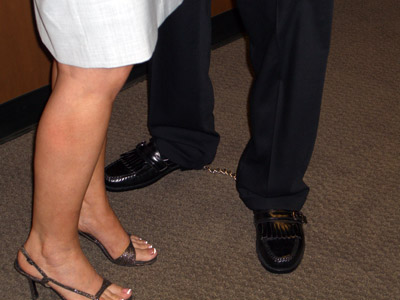After spending more than 10 years in virtual solitary confinement, Enriquez left the gang and was moved to a jail in Los Angeles. Back in his hometown, he was able to reconnect with family. He also entered a relationship with an old friend, whom he married. Enriquez says an essential element of his turnaround was family support.
Enriquez stands with his wife during a wedding ceremony at the federal courthouse in Los Angeles.
Photo courtesy Rene EnriquezRene Enriquez: Imagine having a wife or husband and not having contact with them. In times of tragedy and trouble you can't put your arms around them. It's difficult. I understand that's what incarceration is. But we are social creatures. We are physical creatures. We crave human contact. All humans do. And I'm no different. Just because I was this mobster, this hard guy, doesn't make me any different. I need to feel the touch of my family. I need to smell my wife's perfume. I need to feel my family's embraces. Prison is prison. But human contact is something we all need to survive, maybe not physically but psychologically. I think maintaining strong family bonds is one of the biggest tools in helping men restructure their lives. It's essential.
How could a man have hope if he has no hope? How can a man have a future if he has no future? If he has no one to love, no one to maintain communication with, to retain his humanity. The essence of who he is is his family, the people who love him.
It's a reflection of his innermost self. And absent that, who is he? What defines him? So human contact and these bonds that we maintain, as difficult and as abnormal as they are, this is our normalcy, this is how we maintain our normalcy. This is how I maintain my sanity, is through my family. It's one of the ways I've combated this degradation, this loss of humanity, is through my family and the people who love me. But that's why human contact is important to me. It's medicine for my soul. When I wrap my arms around my wife on the few occasions that we have contact, it just makes me feel alive. It makes me feel that I did the right thing. ... This is what normal people do every day. This is what I've been missing my whole adult life. And I finally found it.
From January to December 2007, Rene Enriquez recorded more than 30 hours of audio diaries on a small digital recorder. He made the recordings from a small jail cell in Los Angeles where he is under federal custody as a cooperating witness. He reflected on the recordings.
Rene Enriquez: It's almost like I'm in a reality show about my life. And I'm recording thoughts and events and recollections and feelings and anger. Things that I had completely forgotten about emerge in my thoughts and words. It's strange.
I went into this process wanting to show the public about a little-known aspect of gang subculture, one that is only talked about in whispers. I wanted to give a deeper view - what attracts men to this lifestyle, why they stay in, and what it takes to get out. But I ended up teaching myself about myself. That was the most profound discovery. I was able to become human again, to become a man.
I think if they handed out a tape recorder to every inmate in the state of California and asked him to record his thoughts, his desires, his frustrations, there would be no more prison violence. You'd have guys working out their frustrations in their prison cells. You'd hear every man talking passionately to himself. And it would be odd.



